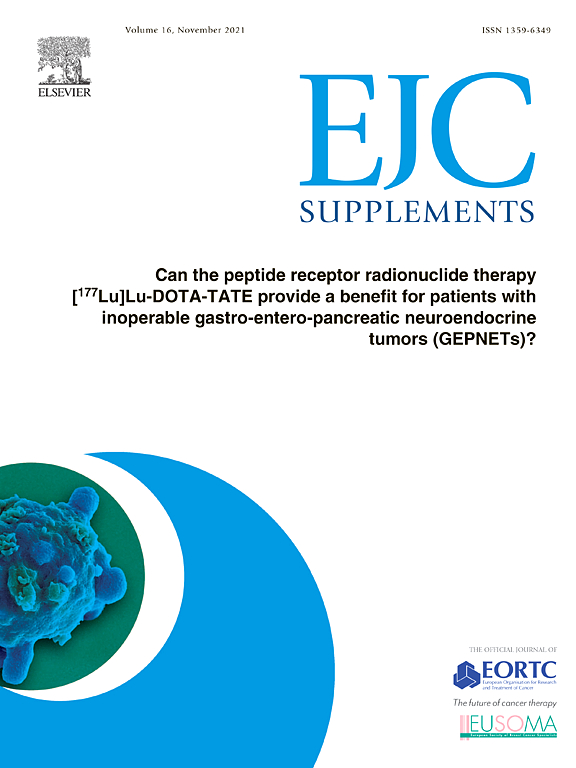P65
摘要
KRAS是调控细胞增殖和细胞存活的Ras/MAPK信号级联的组成部分。KRAS基因的体细胞突变常见于肿瘤,影响肿瘤对靶向治疗的敏感性。结直肠癌(CRC) KRAS基因密码子12或13突变与抗egfr抗体西妥昔单抗和帕尼单抗耐药相关。本研究的目的是建立KRAS基因突变的PCR检测方法,并分析KRAS基因在俄罗斯结直肠癌中的突变频率。Sanger测序法是最常用的突变分析方法。然而,该方法的敏感性为突变等位基因的20%,这通常不足以分析肿瘤中的体细胞突变。最灵敏的突变分析方法之一是等位基因特异性实时PCR。这种方法允许检测样本中1%的突变DNA。这种灵敏度足以分析正常组织中含有2-5%或更多肿瘤细胞的肿瘤样本中的突变。在这项研究中,我们开发并比较了3种新的KRAS检测方法:(1)实时PCR与等位基因特异性引物;(2)带LNA(锁定核酸)阻断剂的实时野生型阻断PCR;(3) rna阻断剂Sanger测序。首先是PCR检测,使用等位基因特异性引物检测KRAS基因12和13个密码子的7个突变并进行基因分型。第二种方法是实时PCR,只使用一对引物和LNA寡核苷酸阻滞剂。LNA-blocker是KRAS基因中具有野生型12和13密码子序列的寡核苷酸。lna阻断剂与野生型KRAS DNA结合强烈,抑制其扩增,但不阻断突变DNA的扩增。带有rna阻断剂的实时PCR可以检测到突变DNA,但不能检测到基因型突变。如果不需要精确的突变基因分型,这种检测方法可以作为KRAS突变病例的一种简单而敏感的筛选试验。我们还使用了na -blocker来提高Sanger测序的灵敏度。为评价新检测方法的敏感性和特异性,采用KRAS基因突变的重组质粒(G12C、G12S、G12R、G12V、G12D、G12A、G13D)制备正常和突变等位基因的不同比例的DNA标准品。优化后,使用2.5-40 ng的人DNA,三种检测KRAS基因突变的方法对突变等位基因的敏感性均为5%。在81份结直肠肿瘤样本中比较了KRAS突变新检测方法的性能。分析前由病理学家评估样品中肿瘤细胞的相对含量。如果样本中肿瘤含量小于20%,则在提取DNA之前,手动对肿瘤细胞数量最多的区域进行宏观解剖。使用“FFPE-DNA试剂盒”(Biolink)从福尔马林固定石蜡包埋(FFPE)组织中纯化DNA。这三种检测方法对临床肿瘤样本中KRAS突变的检测均具有较高的灵敏度(95-100%)和特异性(100%)。81例CRC患者中有37例(46%)存在KRAS基因突变,其中G13D突变12例,G12D突变11例,G12V突变5例,G12C突变4例,G12A突变3例,G12S突变2例,G13R突变1例。1例突变G13R等位基因特异性PCR未检测到,但实时荧光定量PCR检测到,测序证实。新的检测方法具有较高的敏感性和特异性,适用于临床FFPE肿瘤样品中KRAS突变的检测。KRAS is component of Ras/MAPK signaling cascade that regulates cell proliferation and cell survival. Somatic mutations in KRAS gene are often found in tumors and affect the sensitivity of tumors to target therapy. Mutations in codons 12 or 13 of KRAS gene in colorectal cancer (CRC) are associated with resistance to anti-EGFR antibodies Cetuximab and Panitumumab. The objectives of this work were to develop PCR tests for detection mutations in KRAS gene and analyze the frequency of mutations in KRAS gene in CRC in Russia.
DNA sequencing by Sanger is the most common method for mutation analysis. However, the method has a sensitivity of 20% mutant allele, which is often not sufficient for the analysis of somatic mutations in tumors.
One of the most sensitive mutation analysis methods is allele-specific real-time PCR. This method allows to detect 1% of mutated DNA in the sample. This sensitivity is sufficient for analysis of mutations in tumor samples containing 2–5% or more of tumor cells in normal tissue.
In this study we developed and compared 3 new KRAS assays (1) real-time PCR with allele-specific primers; (2) real-time wild-type blocking PCR with LNA (locked nucleic acid) blocker; and (3) Sanger sequencing with LNA-blocker. First assay is a PCR test with seven reactions using allele-specific primers for detection and genotyping 7 mutations in 12 and 13 codons of KRAS gene. Second assay is real-time PCR with only a single pair of primers and LNA oligonucleotide blocker. LNA-blocker is an oligonucleotide which has a wild-type sequence of codons 12 and 13 of KRAS gene. LNA-blocker binds strongly to wild-type KRAS DNA and suppresses its amplification, but does not block amplification of mutant DNA. The real-time PCR with LNA -blocker can detect mutant DNA but does not genotype mutation. Such assay can be used as a simple and sensitive screening test for mutant KRAS cases if exact genotyping of mutation is not required. We also used LNA-blocker to increase sensitivity of Sanger sequencing. To evaluate sensitivity and specificity of new tests DNA standards were prepared with different ratios of normal and mutant alleles using normal human DNA without mutation and recombinant plasmids with mutations in KRAS (G12C, G12S, G12R, G12V, G12D, G12A, G13D). After optimization all three assays had sensitivity 5% of mutant alleles for the detection of mutations in KRAS gene, using 2.5–40 ng of human DNA.
Performance of new assays for KRAS mutations was compared using 81 colorectal tumor samples. Before analysis relative content of tumor cells in the samples was evaluated by pathologist. If tumor content was less than 20% in the sample then regions with a maximum number of tumor cells were manually macrodissected before the DNA extraction. DNA was purified from formalin fixed paraffin embedded (FFPE) tissue using “FFPE-DNA Kit” (Biolink). All three assays had high sensitivity (95–100%) and specificity (100%) for detection of KRAS mutations in clinical tumor samples. Mutations of the KRAS gene were found in 37 of 81 cases (46%) of CRC including 12 cases of mutation G13D, 11 cases of G12D, 5 cases of mutation G12V, 4 cases G12C, 3 cases of mutation G12A, 2 cases G12S, 1 case G13R. A single case with mutation G13R was missed by allele-specific PCR but was detected by real-time PCR with LNA-blocker and confirmed by sequencing.
New assays have high sensitivity and specificity and are suitable for detection of KRAS mutations in clinical FFPE tumor samples.

 求助内容:
求助内容: 应助结果提醒方式:
应助结果提醒方式:


